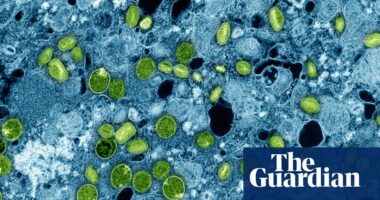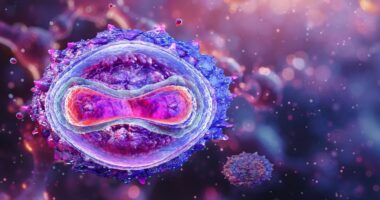Share this @internewscast.com
Diabetes sufferers could one day have pancreatic cells transplanted into their forearms to treat the condition, pioneering research suggests. In healthy bodies, islet cells in the pancreas produce the hormone insulin, which is crucial for regulating blood sugar.
But these cells are destroyed by the immune system in people with Type 1 diabetes. Scientists are developing a technique in which donated islets are transplanted just under the skin on the arm, where they then perform the job of producing insulin.
An ongoing trial with eight patients has seen “encouraging” results. If successful, the treatment could free hundreds of thousands of sufferers from painful injections and the need to frequently check their blood sugar.
The research was described as a “potential game-changer” for Type 1 diabetes at the American Association for the Advancement of Science’s annual conference in Denver this week.
Katy Digovich, chief executive of US biotechnology company Minutia, said: “We’re going to do everything in our power to make it work. But this is hard.”
About 400,000 people in the UK live with Type 1 diabetes. Experts began experimenting with islet transplants for diabetes in the 1960s.
Since 2008, the NHS has treated small numbers of patients who are most severely affected by plummeting blood pressure using deceased donor cells transplanted into the liver.
However, Minutia’s method involving the forearm – developed at the University of California, San Francisco and Duke University – is far less invasive.
The team is also working towards using islet cells grown in a lab from stem cells.
Dr Matthias Hebrok, Minutia co-founder and a diabetes expert at the Technical University Munich, said transplanting cells from dead donors was a well-established method, but using lab-grown cells could be a huge leap forward.
He added: “I think the stem cell-derived cells are a revolution. Of course, we’re at the very early stages.
“But we could generate as many cells as we would like, to treat a tremendous number of patients.”
Ms Digovich has Type 1 diabetes and is passionate about the need for new and better treatments for the debilitating condition.
While working in Africa with the Clinton Health Access Initiative, she found locals were often surprised to learn of her diagnosis. Poor management of diabetes leads to stunted growth, amputations and even death in many African countries.
Ms Digovich said: “Ultimately, I got really angry and the switch flipped. If I was born there, I would be dead. That really hit close to home.
“I took stock of my career and threw myself into the diabetes space trying to create the type of transplant I want in my own body.”
Minutia is also developing a “nanosensor” that can be inserted into transplanted cells to provide an early warning if they are being rejected by the body.
The sensors are microscopic star-shaped pieces of gold many times smaller than the width of a human hair, coated with dye that generates a signal which can be detected outside the body if the rejection process begins.
Dr Lucy Chambers, head of research at Diabetes UK, said: “Cutting-edge cell therapies that enable people with Type 1 diabetes to make their own insulin again are within reach.
“While there’s still much work to do to get these into clinical practice, programmes such as the UK’s Type 1 Diabetes Grand Challenge are bringing us closer to the day when living with Type 1 diabetes no longer requires relentless, round-the-clock self-management, and short and long-term complications are a thing of the past.”













